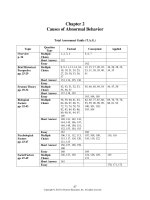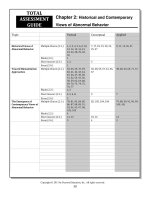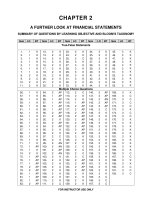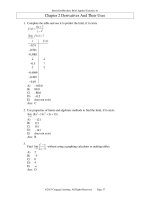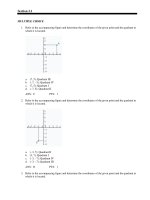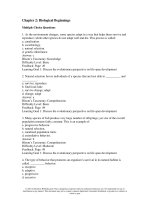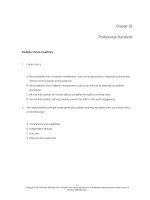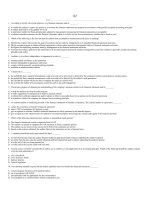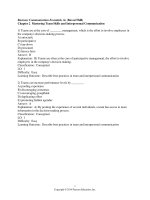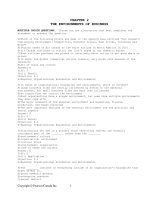Essentials of psychology 6th edition bernstein test bank
Bạn đang xem bản rút gọn của tài liệu. Xem và tải ngay bản đầy đủ của tài liệu tại đây (128.52 KB, 4 trang )
Definitions: Topic 1: The Scientific Method
Unit 2: Research Methods
MULTIPLE CHOICE
1. What approach attempts to gather information and to answer questions in such a way that errors and
bias are minimized?
a. debriefing
c. scientific method
b. random selection
d. variable manipulation
ANS: C
PTS: 1
DIF: Remember
OBJ: LO1: Outline the steps in the scientific method and articulate the importance of each with
respect to psychological research.
TOP: Methods for All Sciences
2. The “scientific” part of psychology refers to its use of ____.
a. the scientific method
c. theories
b. introspection
d. statistics
ANS: A
PTS: 1
DIF: Understand
OBJ: LO1: Outline the steps in the scientific method and articulate the importance of each with
respect to psychological research.
TOP: Methods for All Sciences
3. The scientific method attempts to ____.
a. propose theoretical ideas to answer questions
b. minimize errors and bias in gathering information and answering questions
c. promote common sense understanding
d. dispute common sense by forcing scientists to do experiments
ANS: B
PTS: 1
DIF: Understand
OBJ: LO1: Outline the steps in the scientific method and articulate the importance of each with
respect to psychological research.
TOP: Methods for All Sciences
4. The scientific method is defined as ____.
a. an approach to answering questions that minimizes errors and bias
b. a faith that precise equipment will produce accurate information
c. all of the findings of science in the modern era
d. a set of guidelines published by the American Academy of Science
ANS: A
PTS: 1
DIF: Remember
OBJ: LO1: Outline the steps in the scientific method and articulate the importance of each with
respect to psychological research.
TOP: Methods for All Sciences
5. In conducting an experiment, a precisely worded, educated guess is called a ____.
a. hypothesis
c. variable
b. proposal
d. randomization
ANS: A
PTS: 1
DIF: Remember
OBJ: LO1: Outline the steps in the scientific method and articulate the importance of each with
respect to psychological research.
TOP: Methods for All Sciences
6. What is the method of developing knowledge based on the evaluation of evidence from experiments
and careful observation?
a. introspective approach
c. empirical approach
b. statistical approach
d. theoretical approach
ANS: C
PTS: 1
DIF: Remember
OBJ: LO1: Outline the steps in the scientific method and articulate the importance of each with
respect to psychological research.
TOP: Methods for All Sciences
7. The goals of psychology are to describe, predict, explain, and ____.
a. replicate studies
c. manipulate behavior
b. control events
d. publish results
ANS: B
PTS: 1
DIF: Understand
OBJ: LO1: Outline the steps in the scientific method and articulate the importance of each with
respect to psychological research.
TOP: Methods for All Sciences
8. Hypotheses are ____.
a. conclusions drawn from observations
b. precise predictions that can be tested through research
c. useful only if they prove to be correct
d. explanations that organize observations and account for the relationships among them
ANS: B
PTS: 1
DIF: Remember
OBJ: LO1: Outline the steps in the scientific method and articulate the importance of each with
respect to psychological research.
TOP: Methods for All Sciences
9. Which of the following is a step in the scientific method?
a. Developing a theory
c. Consulting the literature
b. Selecting a research method
d. Forming a hypothesis
ANS: D
PTS: 1
DIF: Remember
OBJ: LO1: Outline the steps in the scientific method and articulate the importance of each with
respect to psychological research.
TOP: Methods for All Sciences
10. Which of the following is the correct order of steps in the scientific method?
a. Forming a hypothesis, developing a research question, gathering evidence, drawing
conclusions
b. Gathering evidence, developing a research question, forming a hypothesis, drawing
conclusions
c. Developing a research question, forming a hypothesis, gathering evidence, drawing
conclusions
d. Formulating a theory, developing a research question, gathering evidence, drawing
conclusions
ANS: C
PTS: 1
DIF: Understand
OBJ: LO1: Outline the steps in the scientific method and articulate the importance of each with
respect to psychological research.
TOP: Methods for All Sciences
11. One important difference between science and everyday observations is that science relies on ____.
a. objectivity
c. perspective
b. introspection
d. subjectivity
ANS: A
PTS: 1
DIF: Remember
OBJ: LO1: Outline the steps in the scientific method and articulate the importance of each with
respect to psychological research.
TOP: Methods for All Sciences
12. Any observation by a human being is, by definition, ____.
a. objective
c. inferential
b. falsifiable
d. subjective
ANS: D
PTS: 1
DIF: Remember
OBJ: LO1: Outline the steps in the scientific method and articulate the importance of each with
respect to psychological research.
TOP: Methods for All Sciences
13. Which of the following best describes scientific knowledge?
a. historical and progressive
c. qualitative and definitive
b. stable and changing
d. quantitative and procedural
ANS: B
PTS: 1
DIF: Understand
OBJ: LO1: Outline the steps in the scientific method and articulate the importance of each with
respect to psychological research.
TOP: Methods for All Sciences
14. The ability to think clearly, rationally, and independently is called ____.
a. moral reasoning
c. free thinking
b. authoritative reasoning
d. critical thinking
ANS: D
PTS: 1
DIF: Remember
OBJ: LO1: Outline the steps in the scientific method and articulate the importance of each with
respect to psychological research.
TOP: Methods for All Sciences
15. The ability to think critically is ____.
a. a skill that people need to learn
b. set by the teenage years
c. genetically determined
d. based on cultural norms
ANS: A
PTS: 1
DIF: Understand
OBJ: LO1: Outline the steps in the scientific method and articulate the importance of each with
respect to psychological research.
TOP: Methods for All Sciences
16. A set of facts and relationships between facts that can explain and predict related phenomena is called
a(n) ____.
a. theory
c. descriptive method
b. hypothesis
d. experiment
ANS: A
PTS: 1
DIF: Remember
OBJ: LO1: Outline the steps in the scientific method and articulate the importance of each with
respect to psychological research.
TOP: Methods for All Sciences
17. The best scientific theories not only explain and organize known facts, but they also generate new
____.
a. facts
c. conclusions
b. predictions
d. behaviors
ANS: B
PTS: 1
DIF: Remember
OBJ: LO1: Outline the steps in the scientific method and articulate the importance of each with
respect to psychological research.
TOP: Methods for All Sciences
18. As Sir Isaac Newton noted, scholars stand ____.
a. on shifting sands
b. beneath the tree of knowledge
c. on the shoulders of giants
d. at the intersection of history and knowledge
ANS: C
PTS: 1
DIF: Remember
OBJ: LO1: Outline the steps in the scientific method and articulate the importance of each with
respect to psychological research.
TOP: Methods for All Sciences
19. What is a proposed explanation for a situation, usually taking the form “if A happens, then B will be
the result”?
a. theory
c. experiment
b. research proposal
d. hypothesis
ANS: D
PTS: 1
DIF: Understand
OBJ: LO1: Outline the steps in the scientific method and articulate the importance of each with
respect to psychological research.
TOP: Methods for All Sciences
20. Scientific hypotheses must be both ____.
a. falsifiable and testable
b. valid and replicable
c. falsifiable and reliable
d. valid and testable
ANS: A
PTS: 1
DIF: Understand
OBJ: LO1: Outline the steps in the scientific method and articulate the importance of each with
respect to psychological research.
TOP: Methods for All Sciences
21. What feature of a hypothesis means that it can be evaluated using known scientific methods?
a. replicable
c. reliable
b. testable
d. valid
ANS: B
PTS: 1
DIF: Understand
OBJ: LO1: Outline the steps in the scientific method and articulate the importance of each with
respect to psychological research.
TOP: Methods for All Sciences
